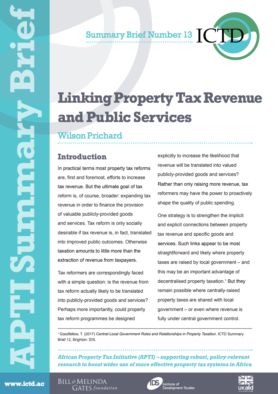ICTD Summary Brief 13
In practical terms most property tax reforms are, first and foremost, efforts to increase tax revenue. But the ultimate goal of tax reform is, of course, broader: expanding tax revenue in order to finance the provision of valuable publicly-provided goods and services. Tax reform is only socially desirable if tax revenue is, in fact, translated into improved public outcomes. Otherwise taxation amounts to little more than the extraction of revenue from taxpayers. Tax reformers are correspondingly faced with a simple question: is the revenue from tax reform actually likely to be translated into publicly-provided goods and services? Perhaps more importantly, could property tax reform programmes be designed explicitly to increase the likelihood that revenue will be translated into valued publicly-provided goods and services? Rather than only raising more revenue, tax reformers may have the power to proactively shape the quality of public spending. One strategy is to strengthen the implicit and explicit connections between property tax revenue and specific goods and services. Such links appear to be most straightforward and likely where property taxes are raised by local government – and this may be an important advantage of decentralised property taxation. But they remain possible where centrally-raised property taxes are shared with local government – or even where revenue is fully under central government control.
